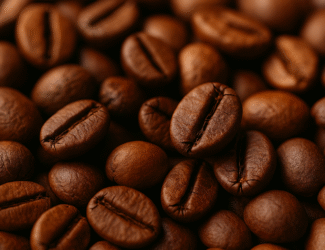
New Study Sheds Light on How Coffee Influences Gut Motility
Qahwa World – Dubai
Coffee’s influence on the human digestive system has long fascinated researchers, physicians and coffee enthusiasts alike. A new peer-reviewed study from Tokushima University, published in Scientific Reports (2025), offers one of the most detailed real-time examinations to date of how coffee affects intestinal motility — and whether stronger brews intensify the effect.
The researchers used a sophisticated, noninvasive technique based on bowel-sound tracking to determine how different concentrations of instant coffee stimulate the gut. Their findings confirm that coffee boosts intestinal motility within minutes — but unexpectedly, the strength of the brew did not produce clear, statistically significant differences. Even so, the study’s exploratory analyses hint at a possible concentration-dependent pattern that deserves deeper investigation.
Listening to the Gut: A High-Tech Approach to Coffee Science
Most previous studies measuring gut function relied on invasive tools or broad metrics such as time to first flatus or defecation after surgery. Those approaches provide only coarse snapshots of digestive activity. The Tokushima team instead used a bowel-sound-based analysis that detects micro-movements of the intestines through highly sensitive electronic stethoscopes and machine-learning-driven sound detection.
This method allowed the researchers to quantify how often the intestines produced movement-related sounds — a reliable physiological marker of motility — every minute for 40 minutes after coffee intake.
The study included 10 healthy young men (average age 20.5 years), each of whom consumed 150 mL of instant coffee at 45°C, prepared in three concentrations:
Weak Coffee (WC): 0.90% total dissolved solids
Strong Coffee (SC): 1.60%
Extra-Strong Coffee (Ex.SC): 2.10%
Each participant completed up to nine trials over non-consecutive days, ensuring that caffeine tolerance or residual effects did not skew the results.
Clear Evidence: Coffee Rapidly Increases Intestinal Motility
Across all concentrations, the intestines responded quickly.
In the first 10 minutes after consumption — the study’s “Gastric Phase” — bowel sounds increased significantly compared to baseline. A second surge appeared between 20–40 minutes, during the “Intestinal Phase.” The repeated-measures statistical analysis confirmed:
Gastric Phase: strong increase vs. baseline
Intestinal Phase: significant increase vs. baseline
No significant difference between the two phases
This confirms that the gut reacts almost immediately to coffee — even before caffeine has been significantly absorbed into the bloodstream.
These short-term effects reinforce earlier evidence suggesting that coffee’s digestive influence is triggered not by systemic caffeine levels, but by chemosensory mechanisms, including bitter-taste receptors and cephalic-phase responses.
Does Coffee Strength Matter? The Study Suggests “Maybe” — But Not Yet Conclusively
The study’s central question was whether stronger coffee produces stronger gut stimulation.
The official result:
In the primary statistical analysis, no significant differences were detected among the weak, strong and extra-strong brews.
But when the team plotted the data using log–log stimulus–response models — a visualization technique sensitive to subtle patterns — a consistent trend emerged:
WC ≥ SC ≥ Ex.SC
In other words, stronger coffee appeared to produce a more pronounced inverse correlation, suggesting a stronger motility response.
This pattern persisted across the entire 40-minute period.
However, the researchers emphasized that these findings are exploratory. They are not strong enough to confirm a concentration effect and must be validated in larger, controlled studies that include a matched hot-water baseline.
Why Coffee Stimulates the Gut: The Chemistry Behind the Motion
The study does not isolate the mechanisms, but its findings align with well-documented physiological pathways:
Caffeine
Antagonizes adenosine receptors
Enhances neural activity
Promotes smooth-muscle contractions
Chlorogenic acids and Polyphenols
Stimulate bitter receptors
Influence intestinal blood flow
May activate the enteric nervous system
Interestingly, the instant coffee used contained approximately 410 mg of polyphenols per 2-gram serving — roughly double the typical amount in a standard brewed cup. This means polyphenols, not just caffeine, could be playing a key role in stimulating the gut in this experiment.
A Step Toward Standardizing Coffee-and-Digestion Research
One of the major contributions of this study is methodological. Past research varied widely in coffee preparation volumes, temperatures and bean-to-water ratios, making results hard to compare. This new study strictly controlled:
Temperature (45°C)
Volume (150 mL)
Total Dissolved Solids (TDS)
The authors argue that tightening these variables is essential for future studies seeking to understand how coffee interacts with digestive physiology.
Limitations: A Strong Start, But More Work Ahead
The authors acknowledge several constraints:
The coffee’s exact arabica/robusta composition was unknown.
There was no temperature-matched hot-water control trial.
One participant could not complete the extra-strong tests.
The sample included only young men; broader demographic data are needed.
The study did not examine individual chemical components separately.
Still, despite these limitations, the study provides compelling evidence that coffee reliably increases intestinal motility and offers a promising framework for future, more definitive research.
What This Means for Coffee Drinkers
For the general public, the study reinforces a simple conclusion:
Coffee can stimulate the gut quickly, regardless of its concentration.
Whether someone prefers a light, medium or bold cup, the intestines seem to react in roughly the same way — at least in the short term.
As for the lingering question of whether stronger coffee produces stronger digestive effects, the answer remains:



